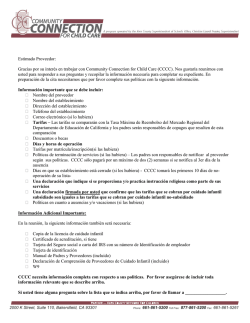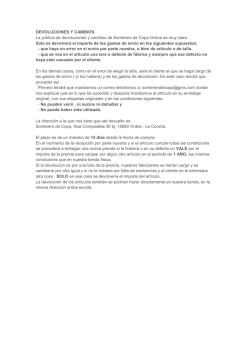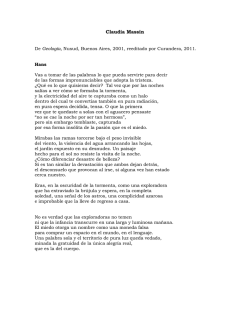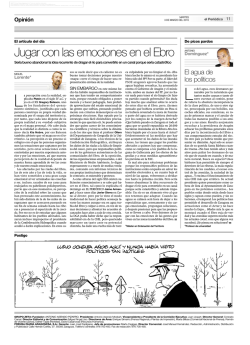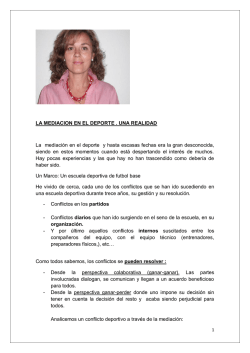
The Syntax of Miguel Delibes and his Contemporaries
The Syntax of Miguel Delibes and his Contemporaries By HENRY MENDELOFF The investigator who undertakes a descriptive study of the syntax of contemporary Spanish prose 1 ), in an attempt to determine the nature and extent of its divergence from the norms of prescriptive grammar, soon discovers that, with regard to certain vital constructions 2 ), there is no absolute body of syntax with which he can come to grips, but rather the syntax of an author, a genre, and a work within a genre. In this study, therefore, we propose to approach the problem b y silhouetting the syntax of one author and one genre, namely, Miguel Delibes and his novels'), against the background of his contemporaries 4 ). Specifically, we shall identify, tabulate, and summarize the syntactic divergences which characterize the novels of Delibes, and project these divergences against the syntax of his contemporaries, in order to differentiate between the strictly individual mode of expression and that which is sufficiently general to b e construed as a syntactic trend worthy of note. Since our concern is with the literary language, we shall exclude from consideration the Diario de un cazador and the Diario de un emigrante, both of which are written in the idiolect of their protagonist-narrator, which precludes generalization, and all examples of syntactic divergence which are found in dialogue only. W e shall also exclude, as extraneous to our purpose, 1) Since there has been no study to date on contemporary syntactic-literary norms, the writer has undertaken such an investigation under a grant awarded by the General Research Board of the University of Maryland. 2) The subordinate pluperfect indicative, the apodosis of a past condition contrary to fact, and the use of object pronouns. 3) All of the following were published by Ediciones Destino, in Barcelona: La sombra del ciprés es alargada (1947), 5th ed. (1959) ¡ Aun es de día (1949), 2nd ed. (1962), El camino (1950), 2nd ed. (1955); Mi idolatrado hijo Sisi (1953), 2nd ed. (1959); La hoja roja (1959); Las ratas (1962), 2nd ed. (1963). 4) Ignacio Aldecoa, Con el viento solano (1956), 2nd ed. (Barcelona: Editorial Planeta, 1962); Camilo José Cela, La familia de Pascual Duarte (1942), 8th ed. (Barcelona: Ediciones Destino, 1957); Angel María de Lera, Los clarines del miedo (1958), 2nd ed. (Barcelona: Ediciones Destino, 1959); Rafael Sánchez Ferlosio, Alianhui (Barcelona: Ediciones Destino, 1961); José María Gironella, Los cipreses creen en Dios (1953), 19th ed. (Barcelona: Editorial Planeta, 1960); Juan Goytisolo, Duelo en el paraíso (1955), 2nd ed. (Barcelona: Ediciones Destino, I960); Carmen Laforet, Nada (1945), llth ed. (Barcelona: Ediciones Destino, 1955); Ana María Matute, Fiesta al noroeste (1959), 3rd ed. (Barcelona: Ediciones Destino, 1963); Elena Quiroga, Viento del norte (1951), 5th ed. (Barcelona: Ediciones Destino, 1956); Juan A. de Zunzunegui, La vida como es (1952), 3rd ed. (Barcelona: Editorial Noguer, 1957). 340 Unauthenticated Download Date | 5/22/16 9:07 PM THE SYNTAX OF MIGUEL DELIBES AND HIS CONTEMPORARIES all stylistic considerations, making no attempt to explain syntactic écarts in terms of literary-aesthetic motivations and objectives. Finally, we shall make only passing mention of sporadic divergences, which are intrinsically interesting, but of no real syntactic import. In La sombra del ciprés es alargada (hereinafter referred to as La sombra) and Aun es de día, Delibes' earliest novels, we find an anomalous concurrence of the -ra and -se subjunctive forms in the expression of the pluperfect indicative of a subordinate verb: La sombra has thirty instances of pluperfect -ra and ten of -se®); Aun es de día, sixteen of -ra and four of -se®). Strangely enough, this concurrence fails to reappear in the subsequent novels of Delibes, and never appears at all in the novels of his contemporaries. The pluperfect -ra in subordinate position occurs four times in El camino 7), nine times in Mi idolatrado hijo Sisí (hereinafter referred to as Sisi)8), seven times in La hoja roja'), and five times in Las raías10). With regard to the contemporary novels, we find eight examples of pluperfect -ra in La familia de Pascual Duarte (hereinafter referred to as Pascual Duarte)ll>, twentyfive in Viento del norte (here the influence of the Galician dialect must be taken into consideration)12', eight in Parts I and II of La vida 5) . . . cosa que hasta este día jamás oyera en sus labios. (16,33) ¡ dejáramos (17,25); prometiera (18,15); designaran (20,23); alcanzara (21,29); iueia (26,24); anunciara, ocupáramos (27: 1,6); íuera (30,42); contemplara (32,35), etc. . . . terminé por perder el poco gusto con que antes recibiese la correspondencia de mi tío . . . (45,27); sirviese (46,38); impresionase (61,12), fuese (87,24), presenciase (100,8); eligiese (115,31); embargase (151,36); experimentase (175,24); hiciese (216,27); circundase (273,42). 6) Recordó entonces el sobre azul que dejara . . . sobre la . . . mesilla . . . (10,4); acaparara (20,18); precediera, tomara (21: 7,8); recorriera (25,25); sirviera, manejara 29: 15,19); atendiera (30,8); produjera (111,6); se hiciera (118,3), etc. . . . aquel manojo de carne . . . que ignoraba por qué ocultos medios apareciese en su casa. (13,6); confiase (65,30); tuviese (71,15); anhelase (227,2). 7) . . . se permitía corregir las palabras que don José . . . pronunciara (7,19); sorprendiera (13,4); antojara (46,30); sospechara (220,19). 8) . . . no halló . . . el estado . . . que ambicionara. (17,26); derribara (24,6); sintiera (26,5); previera, recomendara (132: 1,33); iuera (166,32); señalaran (208,11); fuera (269,16); fuera (288,41). 9) Vestía el traje que le confeccionara Téllez . . . (10,18); regalara, se asentara (10: 20,27); cumplimentara (57,10); dirigiera (69,31); se colgara (189,19); reuniera (191,1). 10) . . . se hallaban las ruinas . . . que Justito . . . volara . . . (10,17); regalara (68,7); mirara (84,30); anunciara (97,24); usara (146,6). 11) . . . le habían quedado de unas bubas malignas que tuviera de joven (49,15); perdiera (60,27); anduviera (61,6); iuera (69,11); tuviera (73,13); diera (76,14); produjera (100,10); dejara (126,19). 12) . . . el niño que ella quiso y acunara (11,6); muriera, viera (14: 24,37); emprendiera (15,34); echara (20,2); viera (21,17); tuviera (22,3); viera (23,21); sacara (24,5); naciera (25,37), etc. 341 Unauthenticated Download Date | 5/22/16 9:07 PM HENRY MENDELOFF como es (pp. 11—397)"), five in Los clarines del miedo1*), and six in Fiesta al noroeste1'). The concurrence of the preterite and the pluperfect indicative in subordinate position is a related but secondary feature of Delibes' syntax. The pluperfect-preterite appears twice in La sombra1'), once in El camino"), twice in Sisi18). We find five examples of the same concurrence in Fiesta al noroeste1'). The concurrence of hubiera and hubiese as the auxiliary of an apodosis of a past condition contrary to fact, with explicit or implicit protasis, is strikingly evident in three of Delibes' novels, and becomes negligible or disappears altogether in the others. In La sombra, there are sixteen examples of hubiera and twenty-seven of hubiese*0); in Aun es de día, seventeen examples of each"); in Sisi, eighteen of hubiera and six of hubiese21) ¡ in El 13) . . . cómo podía llegarse a compartir .. una casita . . . que dejara el viejo en el campo . . . (13,16)¡ entilara (55,36)¡ se desarrollara (66,26); hiciera (227,3); dejara, escribiera (256: 12,17); perdiera (312,4); hiciera (373,24). 14) Tenían ya manchada la . . . camisa que planchara la noche anterior . . . (25,34); levantara (53,29); estudiara (115,16); cumpliera (157,10); sorprendiera (173,14). 15) Todo lo que antes gritara ... estaba ahora en silencio (13,14); doblara (18,17); arrancara (27,14); empujara (49,2); muriera, saliera (59: 3,7). 16) . . . para que supiera . . . que alguien . . . la sorprendió (23,36); enseñó (76,35). 17) . . . le trató desde entonces . . . (16,20). 18) No le agradecía lo que hizo por ella (19,4); se mató (20,36). 19) Se llamaba Juan Medinao, como se llamaron su padre y el padre de su padre. (20,1); burló, echó (25: 9,10); se mató (34,15); se burló (78,2). 20) . . . lo que no hubiera ocurrido de estar en sus cabales. (22,1) ¡ hubiera querido (78,33); hubiera sorprendido (79,3); hubiera importado (102,35); hubiera detestado (114,16); hubiera deseado (117,28); hubiera conducido, hubiera sido (129: 21,24); hubiera resultado (148,39); hubiera juzgado (171,26), etc. . . . lo raro que hubiese sido que la mujer dijera . . . (15,12); hubiese podido (23,23); hubiese guardado (25,18); hubiesen atendido (28,7); hubiese equivalido (45,2); hubiésemos enflaquecido (70,36); hubiese agradado (78,23); hubiese dispensado (81,5); hubiese aclarado, hubiese querido (85: 34,42), etc. 21) Le hubiera gustado prolongar la vida de aquel ser . . . (26,3); hubiera salido (37,33); hubiera deseado (48,7); hubiera acertado (65,7); hubiera aceptado (66,24); hubiera deseado (82,3); hubiera advertido (83,11); hubiera amordazado (110,1); hubiera deseado (117,19); hubiera agradado (135,34), etc. . . . con los ojos vendados . . . hubiese acertado con su casa . . . (18,14); se hubiese guiado (18,17); hubiese muerto (26,10); hubiese llevado (30,29); hubiese cambiado (33,30); se hubiesen visto (53,34); hubiesen hablado (68,18); hubiese agradado (73,1); hubiese elegido (75,25); se hubiese cortado (86,27), etc. 22) . . . un hombre de treinta y siete años que . . . hubiera deseado detenerse en treinta y cinco. (13,21); hubiera sido (13,30); hubiera remediado (24,12); se hubieran marchado, hubiera rehusado (38: 22,23); hubiera hedió (44,12); hubiera desistido (64,23); se hubiera arrojado (94,41); se hubiera ruborizado (115,12); hubiera llorado (18,12), etc. 342 Unauthenticated Download Date | 5/22/16 9:07 PM THE SYNTAX OF MIGUEL DELIBES A N D HIS CONTEMPORARIES camino, t w e n t y - o n e of hubiera a n d o n e of hubiese* 1); in La hoja roja, five of hubiera a n d o n e of hubiese u); a n d in L a s r a t a s , f o u r of h u b i e r a a n d n o n e of h u b i e s e " ) . In t h e c o n t e m p o r a r y n o v e l s , N a d a h a s o n e e x a m p l e of h u b i e s e " ) , a n d V i e n t o del norte h a s four 1 7 ). T h e r e is n o c o n c u r r e n c e in D e l i b e s ' s y n t a x b e t w e e n hubiera a n d habría a s the a u x i l i a r y of a n a p o d o s i s of a p a s t c o n d i t i o n c o n t r a r y to fact. T h e s a m e h o l d s true f o r Pascual Duarte, with t w e n t y - t h r e e i n s t a n c e s of hubiera 1*); Viento del norte, w i t h t w e l v e " ) j La vida como es, w i t h ten' 0 ); Duelo en el paraíso, w i t h sixteen 3 1 ); Fiesta al noroeste, with five®2); a n d Alíanhuí, with . . . le hubiese gustado alterar la tradición familiar . . . (9,7); hubiese esperado (38,23); hubiese ¡levado (94,41); hubiese sido (108,33); hubiese importado (134,33); hubiese pedido (231,23). 23) Pero esto hubiera sido truncar el camino . . . (38,10); hubiera recusado, hubiera hecho (46: 2,7); hubieran notado (51,22); hubiera aprendido (56,19); hubiera esquivado (68,26); hubieran preterido (84,26); hubiera dado (99,1); hubiera sido (115,19); hubiera ocurrido (143,13), etc. Las frases que voceaba hubiesen resultado abstrusas . . . (78,14). 24) De haberlo hedió hubiera llegado a la conclusión . . . (65,16); hubiera querido (103,17); hubiera sido (116,26); hubiera acudido (174,12); hubiera sucedido (222,16). Y si la Antonia no se hubiera empeñado en llevarle aquella mañana al funeral . . . , su calor hubiese muerto regularmente . . . (136,11). 25) El pueblo . . . , de no ser los huecos de luz y las sombras . . . hubiera pasado inadvertido. (13,20); hubiera ocurrido (41,13); hubiera continado, hubiera colgado (70,3). 26) . . . me guardaba rencor aquel día que él hubiese querido lucirse entre sus amigos. (197,14) 27) Hubiese explotado la información si malo f u e r a . . . (21,20); hubiese podido (152,3); hubiese preferido (157,8); hubiese gustado (282,13). 28) Haberlas dado antes hubiera sido quizás un poco precipitado. (29,3)¡ hubiera tenido (29,9); s e le hubiera ocurrido (50,23); hubiera dado, se hubiera creído (56: 10,21); hubiera podido (57,29); hubiera valido (58,4); s e hubiera atrevido (63,6); se hubiera marchado (63,20); hubiera costado (95,20), etc. 29) . . . de saberlo, . . . la hubiera protegido. (11,34); hubiera alzado (19,8); hubiera sido (143,30); hubiera comprendido, hubiera guiado (152: 2,7); hubiera querido (159,24); hubiera contestado (168,28); hubiera deseado (170,14); hubiera tomado (195,23); hubiera preierido (197,8); hubiérase casado (170,14), etc. 30) Un escritor novel no hubiera saludado con más veneración . . . (130,30) ¡ hubiera pensado (136,20); hubiera sido (143,12); hubiera sido (166,18); hubiera vendido (186,33); s e hubiera reído (214,4); hubiera llenado (234,11); hubiera enseñado (293,29); hubiera dado (311,29); hubiera sucedido (343,23). 31) Se hubiera dicho que un cazador . . . acababa de cobrar una pieza . . . (9,11); hubiera deseado (14,17); hubiera dicho (17,5); hubiera bastado (18,23); hubiera causado (57,29); hubiera deseado (65,27); hubiera creído (138,22); hubiera hedió, hubieran tomado, hubiera renunciado (140: 18,23,26); hubieran tomado (150,2), etc. 32) . . . se hubiera apoderado de su fe . . . (103,2) ¡ hubiera abofeteado (105,9); hubiera derribado, hubiera pisoteado (107: 22,23); hubiera ardido (117,28). 343 Unauthenticated Download Date | 5/22/16 9:07 PM HENRY MENDELOFF six"). In Nada, there are s e v e n examples of hubiera and one of habría3*)-, in Parts I and II of Los cipreses creen en Dios (pp. 17—362), there are seventytwo of hubiera and eight of habría3"); in Con el viento solano, there are seven of hubiera and one of habríaM) ¡ and in Los clarines del miedo, there are two of hubiera and one of Aabr/a37). The laísmo which characterizes the syntax of La hoja roja appears only sporadically in the other novels of Delibes. There are thirty-seven examples of laísmo in La hoja roya38); four in Aun es de día3*)-, three in El camino40); seven in Si sí"); one in La sombra**); and one in Las ratas. Leísmo is a syntactic feature of minor importance: it occurs five times in La hoja roja*3), once in La sombra**), and once in Aun es de día45). 33) . . . esta piedra, y nada hubiera deseado en el mundo tanto como tenerla. (27,6) ¡ hubiera sabido (87,13) ¡ hubiera llegado (102,28) ¡ hubiera entendido, se hubiera quedado (119: 5,7); hubiera querido (127,7). 34) Hubiera besado sus manos si ella lo hubiera querido (109,23) ¡ hubiera sentido (144.12); hubiera servido (176,9); hubiera querido (181,10); me hubiera olvidado (191.13); hubiera querido (202,8); hubiera sido (240,32). El miró al niño con una preocupación que me habría parecido extraño si . . . (171,25). 35) Sin una peña de amigos . . . hubiera muerto (20,13); hubiera querido (22,1); hubiera querido (25,42); hubiera pasado (27,37); hubiera jurado (30,10); hubiera sido, hubiera parecido, hubiera errado (40: 12,13,35); hubiera querido (43,7); se hubiera dicho (50,43), etc. Un neumático que hubiera reventado, y la gente habría alcanzado el límite de la felicidad (42,33); habrían sulrido (71,27); se habrían casado (120,34); habría sido (255,36); habría desplegado (286,31); se habría suicidado (337,15); habría hecho (341,6); habría sido (347,28). 36) Si hubiese tenido tiempo, acaso hubiera tirado la pistola . . . (52,11); hubieran hecho, hubiera sido, hubiera sido (104: 8,27,28); hubiera gustado (151,8); se hubiera reído, hubiera sido (216: 11,12). Si él se hubiera entendido con Francisco, . . . ellos habrían vivido. (105,1) 37) Hubiera querido decirle algo, . . . (75,24); hubiera querido (174,25). Antoñito se habría asustado, pero estando cerca su padre . . . (194,15). 38) A la Desi no la quitaban el sueño (24,2); la prestó, la decía (26: 3,21); la dijese, la decía (27: 4,11); la ocurría (28,19); la decía, la decía (29: 6,19); la contaba (30,1); la explicaba (33,4), etc. 39) La acarició la mejilla . . . (11,32); las rozaba, las musitaba (33: 21,22); la brindaba (252,4). 40) Y a las cotillas no las viene mal . . . (41,5); la iba (85,2); la gustaba (105,28). 41) . . . no la gustaban sus lentes de oro (51,34); la dio (69,21); darla (73,33); la dio (198,34); la dijo (221,17); Ja dio (230,17); la habló (275,6). 42) Me insistía en que . . . la facilitase detalles sobre nuestro hogar. (258,16) 43) Había un recorte . . . que el tío Hermene, . . . al concluir de leer/e . . . (13,10); diciéndoie (llamándola), buscarJe (46: 3,5); le unió (119,7); Je depositaron (188,18). 44) Un osteólogo le había comprado . . . el esqueleto para examinarle después de muerta. (196,5) 45) Sebastián tuvo la impresión de que aquel rostro Je había visto . . . (22,23). 344 Unauthenticated Download Date | 5/22/16 9:07 PM THE SYNTAX OF MIGUEL DELIBES AND HIS CONTEMPORARIES Among the sporadic divergences in the novels of Delibes, the following are the most noteworthy: in La hoja roja, two instances of the present indicative in the protasis of a past condition contrary to fact whose apodosis is expressed by hubiera and past participle4*); in Aun es de día, one instance of quienes with an inanimate referent"); in Sisi, 1) two instances of the -ra form used as a pluperfect in the protasis of a past condition contrary to fact, 2) one instance of the imperfect passive for a perfective verb whose action is simultaneous with the tense of narration, 3) one instance of quienes with inanimate referent, and 4) one instance of the simple conditional used to express the past apodosis of a condition contrary to fact 48 ); and in La sombra, two instances of quien with the same inanimate referent 4 '). On the basis of our investigation, we conclude that the syntax of the novels of Miguel Delibes coincides with that of his contemporaries in the use of 1) the -ra form to express a subordinate pluperfect indicative, and 2) hubiera, to the virtual exclusion of habría, as the auxiliary of the apodosis of a past condition contrary to fact. Conversely, Delibes' syntax diverges sharply from that of his contemporaries in the use of 1) the -se form as a concurrent of the -ra form, to express a subordinate pluperfect indicative (la sombra and Aun es de día), 2) hubiese as a concurrent of hubiera as the auxiliary of the apodosis of a condition contrary to fact (La sombra. Aun es de día, and Sisí), and 3) la(s) instead of prescriptive le(s) (La hoja roja). University of Maryland, Spring 1967 46) . . . todo lo hubiera olvidado si la Antonia no remacha horas más tarde en el mismo clavo . . . (137,2) ¡ se tropieza (222,15). 47) . . . temperamentos expansivos y locuaces a quienes más temía Sebastián. (34,34) 48) Quizás si . . . su padre no agarrara el tifus . . . (38,21)¡ pareciera (118,13)¡ . . . soñaba que Cecilín . . . era enterrado en la bañera blanca del anuncio. (99,5) ¡ . . . eran los brazos de su padre quienes le aguardaban (105,22); Cecilio Robles no sabría decir si buscaba en ella un conato de incendio . . . (13,32). 49) . . . fue la guerra quien la quebró, quien la deshizo completamente. (147,4) 345 Unauthenticated Download Date | 5/22/16 9:07 PM
© Copyright 2026
